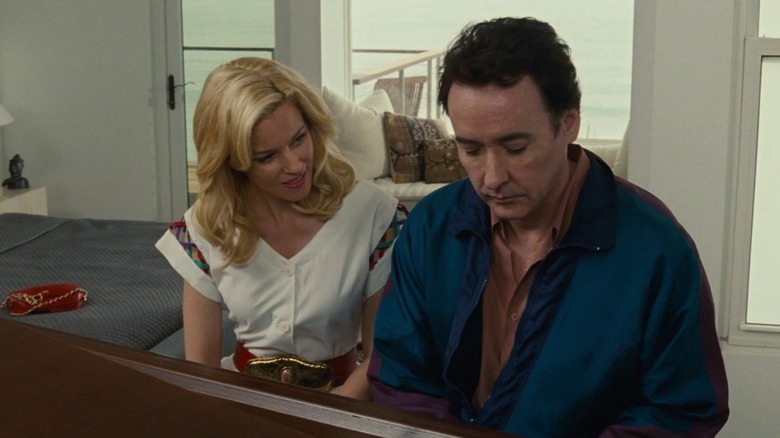Brian Wilson Was The Subject Of The Most Underrated Music Biopic Ever Made
Brian Wilson wrote some of the most beautiful music to ever grace this confounding world. His songs are eerily perfect and, in terms of the creative process, impossible to reverse engineer. Obviously, you can break down the songwriting structure and meticulous production of masterpieces like "Surfer Girl," "When I Grow Up to Be a Man," and "Don't Worry Baby," but accounting for their existence, how they came into being, how someone could hear such exhilaratingly strange harmonies and convey them to his bandmates... this was nothing short of sorcery.
Upon learning that Wilson has passed away at the age of 82, I was struck with the same sense of melancholic hope that I feel every time I listen to "God Only Knows" (so well used in "Boogie Nights") or "I Just Wasn't Made for These Times." From measure to measure, these songs swing from deep sadness to unfettered joy; they encompass the totality of how it feels to be human. They're both reassuring hugs and shoulders to cry on. They are forever, but Wilson was not. And while I'm broken up over the thought that this singular creature has left us, there is some solace to be found in his departure.
All artistic geniuses are not created equal. Some can be brash, hard-charging, and breathtakingly adaptable to change. Others can be fragile, frightened, and prone to bouts of severe depression. When they cannot assuage the sadness and anxiety of their lives through healthy means, they punch in the cheat code of drugs and alcohol. It's in these substances that they find temporary relief and, on occasion, dislodge the sounds and visions that are stuck in their heads. But there's a bill that will inevitably come due. When you alter your consciousness and neglect your physical well being for an extended period of time, you can only bounce back so far. It's a life of diminishing returns. Yet, somehow, despite battling the demons in his head and, infuriatingly, in his life for many decades, Wilson proved resilient enough to complete two of the most astonishing works of art ever imagined. And there is a very good film that will give you a stirring sense of how he pulled it all together at two very different periods in his life.
Love & Mercy is a penetrating portrait of a perpetually thwarted genius
Bill Pohlad's "Love & Mercy" is a fascinating two-hander of a biopic. It's a tag-team acting feat that brings out the very best in two phenomenal actors (Paul Dano and John Cusack) as they play Brian Wilson struggling under the impossible weight of a possibly ill-advised creative undertaking called "Smile." Both timelines are harrowing in their own right, but Dano's segment is particularly upsetting because, if you know Wilson, you're well aware that this is when this sui generis seeker became unmoored from reality due to LSD. The younger Wilson was also abused on various levels by his father Murry (Bill Camp) and his legendarily awful cousin Mike Love (Jake Abel).
Cusack's part of the story is set in the 1980s, where Wilson muddles through life under the supervision of quack psychologist Dr. Eugene Landy (Paul Giamatti). This is the more conventional chunk of the movie, but Pohlad manages to make it sing by juxtaposing it with the liveliness of Wilson's earlier explorations. It also helps that Elizabeth Banks gives one of her best performances to date as Melinda Ledbetter, the car saleswoman who helps the musician break free of Landy's controlling influence.
Pohlad's movie is at its best when it shows Dano's Wilson collaborating with the Wrecking Crew — as good a session band as ever existed — on the recording of the album "Pet Sounds," a stone-cold masterpiece that was, in its day, viewed as a baffling misfire. Music biopics are self-parody anymore (I mean, it's been 18 years since Jake Kasdan's "Walk Hard: The Dewey Cox Story" torched the form), but this is a movie that cares more about the mental health of its brilliant protagonist than in sparking new interest in his back catalog. Wilson did not come out on the other side of his decades-long battle with mental illness and substance abuse as a genius reborn. But it seems like he did find some measure of peace. And now peace is all he has. Meanwhile, we get the music. And we've never needed such uncommon beauty more than we do now. Thank you, Mr. Wilson.

